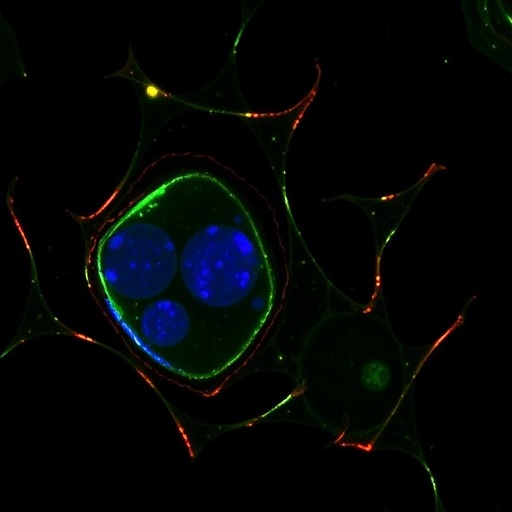In a groundbreaking study, researchers unveil a method to selectively target one of the most notorious players in cancer biology: the KRAS gene. Specifically, they focus on the KRAS-G12V mutant, a variant that presents unique challenges due to its structural nuances. KRAS, one of the most frequently mutated oncogenes, has long been a thorn in the side of cancer therapeutics. Despite significant advances in understanding KRAS biology and its role in tumorigenesis, effective strategies for targeting its various mutant forms remain sparse. This study signals a paradigm shift in the approach to combating this formidable target.
The research taps into the power of CRISPR-Cas9 technology, employing genome-wide knockout screens to uncover genes capable of modulating the expression and function of KRAS-G12V. This innovative screening methodology enables researchers to systematically assess the impact of gene disruptions on the behavior of KRAS mutants. By honing in on specific genetic components that interact with KRAS-G12V, the team uncovered a particularly intriguing candidate: ELOVL6, a fatty acid elongase that catalyzes the elongation of fatty acids.
The identification of ELOVL6 as a modulator of KRAS-G12V offers profound implications for targeted cancer therapy. The study’s results indicate that ELOVL6 plays a crucial role in regulating the oncogenic signaling pathways activated by mutant KRAS. Notably, the team found that attenuating ELOVL6 activity leads to a significant reduction in KRAS-G12V protein levels, effectively silencing its downstream signaling cascades that promote tumor survival and proliferation. This selectivity emphasizes the potential utility of ELOVL6 as a therapeutic target in cancers characterized by KRAS-G12V mutations.
Importantly, the research elucidates the biochemical mechanisms through which ELOVL6 exerts its effects on mutant KRAS. The study reveals that ELOVL6 is intricately involved in the production of specific phospholipids that are crucial for the post-translational modification and stabilization of KRAS. These fatty acid derivatives serve as essential components for the membrane localization of KRAS, thereby influencing its functional capacity. By disrupting this lipid metabolism pathway, researchers demonstrated a feasible strategy to induce degradation of mutant KRAS proteins.
In an era where targeted therapies are gaining traction, the insights from this study pave the way for the development of a first-in-class small-molecule inhibitor aimed at selectively degrading KRAS-G12V. By leveraging the unique biology of ELOVL6, the research team has opened new avenues for therapeutic innovation. The potential for such interventions to produce significant tumor regression creates an exciting prospect for patients with KRAS-driven malignancies, a group notoriously resistant to conventional treatments.
As the landscape of cancer therapy continues to evolve, this study aligns with the broader trend of precision medicine, where treatments are tailored to the unique genetic and molecular profiles of individual patients’ tumors. The findings underscore the importance of mechanistic understanding in developing targeted approaches to combat cancers driven by specific oncogenic mutations. ELOVL6 may now emerge as a beacon of hope for targeting KRAS-G12V, thereby necessitating further exploration into its role and mechanism of action.
Despite the excitement surrounding these discoveries, challenges remain. The journey from bench to bedside is fraught with complexities, and translating these findings into clinical applications warrants rigorous validation through preclinical and clinical trials. Researchers must ascertain that inhibiting ELOVL6 will indeed yield favorable outcomes without untoward effects on normal cellular processes.
Furthermore, the specificity of ELOVL6 targeting raises questions about the broader implications of manipulating lipid biosynthesis in healthy tissues. As with any novel therapeutic avenue, safety profiles must be thoroughly evaluated to prevent unintended adverse effects. A balanced approach, closely monitored by regulatory frameworks, will be vital in guiding the transition from experimental research to practical solutions in cancer therapy.
The research conducted by Hu et al. heralds an exciting chapter in the ongoing efforts to tackle KRAS mutant cancers. By uncovering the potential of ELOVL6 as a therapeutic target, the team not only contributes valuable knowledge to the field of cancer biology but also sets the stage for a new class of targeted therapies. As the scientific community anticipates further developments, these advancements underscore the resilience of researchers in the face of challenging oncogenic targets.
As understanding deepens about the intricacies of mutant KRAS and its interactions with cellular machinery, we can expect a ripple effect across oncology, potentially benefiting a multitude of patients facing KRAS-driven tumors. The race to conquer such formidable cancer drivers is far from over, yet with innovative approaches like those demonstrated by Hu and colleagues, hope for effective treatment options continues to grow.
The significance of this study extends beyond mere scientific inquiry. It embodies the relentless pursuit of knowledge and the desire to translate that knowledge into real-world solutions for patients grappling with cancer. By bridging the gap between basic research and clinical application, this work signifies a vital step forward in the fight against one of cancer’s most persistent adversaries.
In summary, the research on ELOVL6’s role in modulating KRAS-G12V reaffirms the notion that understanding cellular metabolism and its interplay with oncogenic signaling is crucial. This promising line of inquiry not only highlights ELOVL6’s importance but also positions it as a valuable target for future therapeutic endeavors. With the right momentum, this study could serve as a catalyst for change in how we approach KRAS-driven cancer therapies, ultimately leading to better patient outcomes.
Subject of Research: Mutant KRAS and its modulation via ELOVL6
Article Title: ELOVL6 activity attenuation induces mutant KRAS degradation
Article References:
Hu, X., Atwal, R.S., Xiao, S. et al. ELOVL6 activity attenuation induces mutant KRAS degradation.
Nat Chem Biol (2025). https://doi.org/10.1038/s41589-025-01998-x
Image Credits: AI Generated
DOI: https://doi.org/10.1038/s41589-025-01998-x
Keywords: KRAS, ELOVL6, cancer therapy, mutant KRAS, oncogenes, CRISPR, targeted therapy, lipid metabolism, phospholipids, precision medicine.
Tags: cancer biology and therapeutic advancementsCRISPR-Cas9 technology in cancer researchELOVL6 and KRAS interactionfatty acid elongase role in oncogenesisgenome-wide knockout screens for cancer therapyimplications of ELOVL6 in cancer therapyinnovative screening methodologies in cancer researchKRAS-G12V mutant targetingmodulating gene expression in cancer treatment.selective targeting of KRAS genestrategies for targeting mutant oncogenesunderstanding KRAS biology and tumorigenesis





